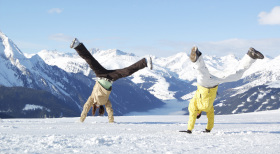Wearing In Your Orthotics

Orthotics are often prescribed to relieve many causes of foot pain as well as hip, knee and lower back problems caused by over use or incorrect body alignment. They can decrease pain, increase stability and reduce pressure from over loaded areas.
With so many benefits and such a high success rate its no wonder most people take to their orthotics like a duck to water. Even so, its important to remember that it generally takes 1-2 weeks for most people to become fully accustomed to their new orthotics so try not rush your feet too quickly into their new position.
To assist with the care of your orthoses we recommend the following:
With so many benefits and such a high success rate its no wonder most people take to their orthotics like a duck to water. Even so, its important to remember that it generally takes 1-2 weeks for most people to become fully accustomed to their new orthotics so try not rush your feet too quickly into their new position.
To assist with the care of your orthoses we recommend the following:
Wearing in period
In most cases your podiatrist will recommended you wear your orthotics in gradually ie for 1 hour of periodic standing or gentle walking the first day, and increase the wearing time by 1 hour each day. This means that in 7 days you should be able to wear your orthotics for 7 hours. If you find this too quick for your feet your podiatrist may recommend that you try increasing your time in your orthotics by 15mins at a time to begin with.
Wearing in time is not the same for everyone. Some people, in particularly children, find that they can wear their orthotics for longer periods during the break in phase, while others may experience discomfort if they push it too quickly. Let your body guide you. Sports & Orthotics

It is advised to refrain from sports until you are both completely comfortable in wearing your orthotics at least a week or after your first orthotic review (2 weeks after dispense). Wearing them all day for a week in comfort is a good indication that your muscles are adapting well to their new position.
When your first start wearing your orthotics for sport, you should be aware that you must also wear them in gradually at this time too. Wearing them in gradually allows your feet to adapt to a different functioning posture, and for you skin to toughen up in areas where they may previously not have been touching anything (and are now in contact with the orthotics).
|
Shoes and Socks
There's an old saying that says your orthotics are only as good as the shoes you wear them. If you have any questions you need answered feel free to discuss the types of shoes you may want to wear your orthotics with to your podiatrist.
- Socks: If possible it is generally advised to wear socks or stocking with your orthotics (especially during the break in period). If you're someone who likes to wear your orthotics in shoes without socks make sure you gently clean them regularly and let your podiatrist know which shoes you like to wear them in as there are many choices of top covers for your orthotics better suited to bare feet than others. - Heel slipping when walking. Some shoe designs are too low cut at the heel to be suitable to wear orthotics with which is why you should bring your orthotics with you when you go shoe shopping. If there are shoes you already have that are slipping, its worth mentioning to your podiatrist as they may be able to thin your orthotics for fit or fit you with a pair of fashion orthotics which contain no bulk in the heel at all. - Buying shoes for orthotics: It is important to try on new shoes with your orthotics prior to purchasing them, especially running shoes. Avoid designs that do not have a method of securing the shoe close to your foot such as a strap or a lace. - Other shoes & fashion shoes: In some circumstances, the shoes which you desire to wear will not be appropriate or compatible with your orthotics (such as going to a wedding). Providing you do not spend a lot of time walking with out your orthotics, this should not pose a problem to the success of your orthotic therapy. Where these shoes are to be worn for longer periods there are other forms of arch supports that may be suitable and should be discussed with your podiatrist. (new page coming soon) - Squeaking: if the orthotics cause an audible squeaking in your shoes, try wiping the edges of the device with the smallest amount of talc. If this doesnt work let us know and we can try a few of our tricks to sort it out. Aching Feet
In rare cases aching may be felt in the initial wearing in period. In most cases this a simply the muscles and joints of the feet getting used to working in a whole new way - a better way! This aching can be a sign of your body getting used to your new biomechanics (the way you move). It makes sense really - after all if your a sloucher who tried to sit up with your back straight all day you you'd feel it in your back too. Not to worry though, if discomfort occurs do not become discouraged as these are signs that postural adaptations are occurring, and generally for the better. It might just mean that you have to wear them in slower or that you need to get them fine tuned or modified by your podiatrist for comfort. If pain occurs see your podiatrist.
|
Contact Us |
Services |
Foot Conditions |
|




